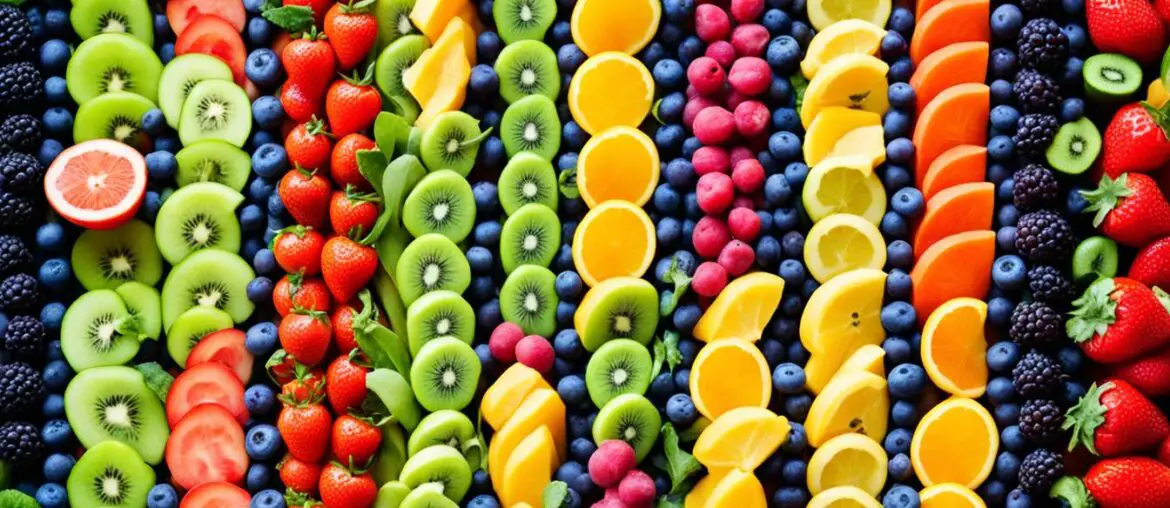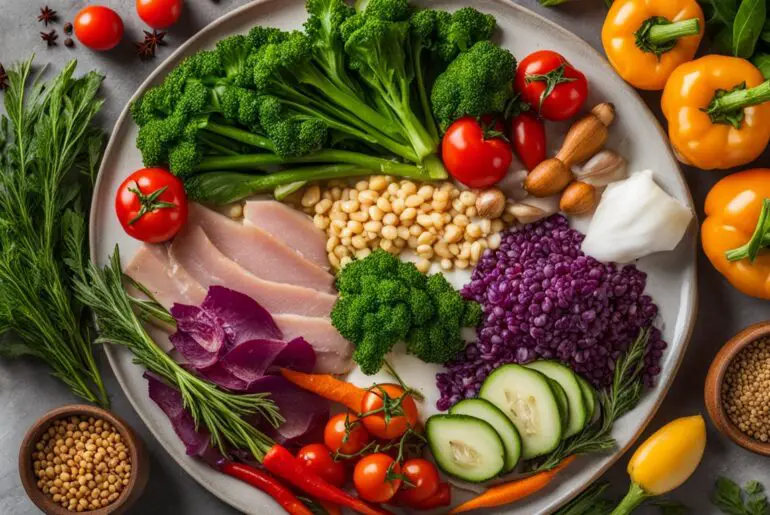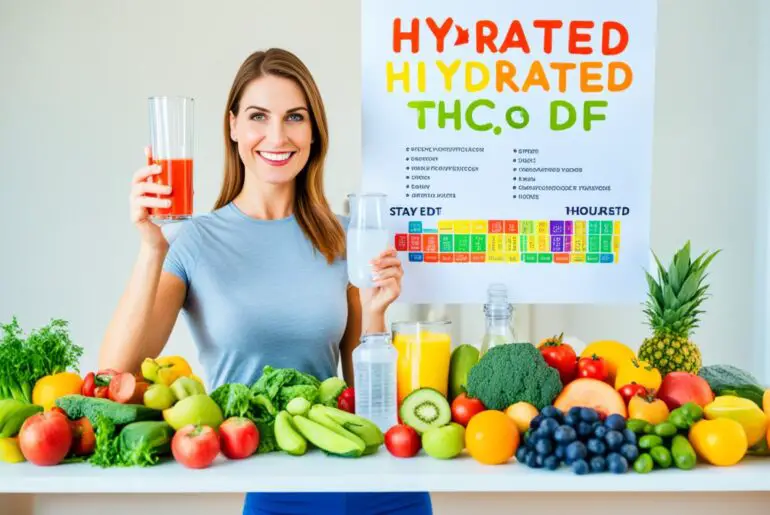Did you know that the HCG diet, a popular weight loss regimen, restricts daily calorie intake to just 500 calories? This extreme calorie restriction, combined with HCG hormone injections, can lead to rapid weight loss. However, many individuals on the HCG diet may be concerned about their nutrient intake and wonder if they can take vitamins to support their health during this time.
According to Dr. Simeons, the doctor who developed the HCG diet, vitamin supplementation is generally not necessary as the body obtains all the necessary nutrients from the HCG injections, the low-calorie diet plan, and the stored fat that is burned for energy. However, there are a few vitamins that are allowed on the HCG diet, such as vitamin D, vitamin C, and vitamin B12, which can provide additional support. It is important to understand the role of vitamins and minerals post HCG diet to ensure optimal health and well-being.
Key Takeaways:
- Although vitamin supplementation is generally not necessary during the HCG diet, a few vitamins like vitamin D, vitamin C, and vitamin B12 are allowed and can be beneficial.
- It is important to maintain proper nutrient intake after completing the HCG diet to ensure optimal health and well-being.
- A balanced diet and hydration are key factors in replenishing essential vitamins and minerals post HCG diet.
- Consulting a healthcare provider is recommended to ensure personalized guidance on nutrition and vitamin supplementation after the HCG diet.
- Safe and sustainable weight loss methods, including a healthy diet and regular exercise, should be prioritized for long-term success.
Do You Need Extra Vitamins on the HCG Diet?
When embarking on the HCG diet, many individuals are concerned about their nutrient intake and whether they need to take extra vitamins. As the creator of the HCG diet, Dr. Simeons had a specific view on the need for additional vitamins during the diet.
Dr. Simeons believed that the body obtains all the necessary vitamins and minerals from the HCG injections, the low-calorie diet plan, and the stored fat that is burned for energy. His patients did not experience any significant vitamin deficiencies or negative health effects while on the HCG diet.
This suggests that additional vitamin supplementation is usually not required during the HCG diet. Dr. Simeons’ perspective aligns with the belief that the body can naturally obtain the necessary nutrients during the diet regimen.
While the HCG diet focuses on calorie restriction and hormone injections, it is still important to maintain a balanced diet and consume foods that provide essential vitamins and minerals. Overall, the HCG diet provides an adequate nutrient intake to support the body’s needs during the weight loss process.
Next, let’s explore the specific vitamins that are allowed on the HCG diet and their importance in supporting overall health.
Allowed Vitamins on the HCG Diet
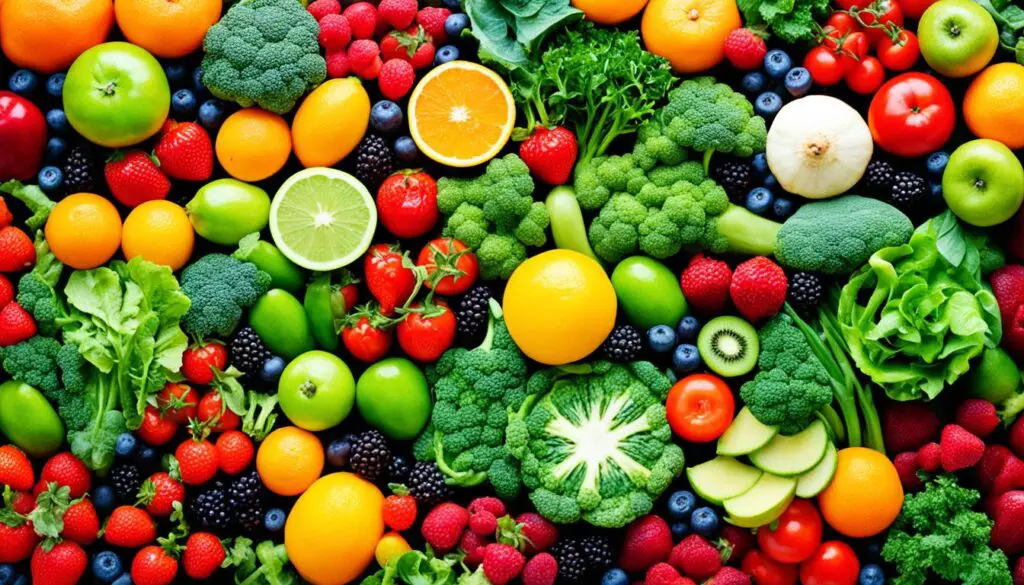
While most vitamins are not recommended on the HCG diet, there are a few exceptions. Dr. Simeons allowed certain vitamins to be included in the diet protocol to address specific needs and support overall health.
Vitamin D: Vitamin D is permitted on the HCG diet and can be especially beneficial for individuals with tooth problems. This essential vitamin plays a crucial role in maintaining healthy teeth and bones, along with supporting immune function.
Vitamin C: Another allowed vitamin on the HCG diet is vitamin C. This powerful antioxidant is known for its immune-boosting properties and can help protect the body against oxidative damage. Incorporating vitamin C-rich foods or supplements can be beneficial during the diet.
Vitamin B12: Vitamin B12 is also allowed on the HCG diet and can be taken through injections or capsules. This vitamin is essential for maintaining proper nerve function, supporting red blood cell production, and aiding in energy metabolism.
It is important to note that when selecting vitamin supplements, it is crucial to check the ingredients. Some supplements may contain sugars and artificial flavors, which can interfere with the HCG diet’s effectiveness. Choosing high-quality, pure vitamin supplements is recommended to ensure compatibility with the diet plan.
Post HCG Diet Nutritional Tips
After completing the HCG diet, maintaining a balanced and nutritious diet is essential for long-term success in weight management. Here are some helpful tips to guide your post-diet nutrition:
- Focus on Balanced Nutrition: Make sure to consume a variety of nutrient-rich foods to replenish your body’s needs. Include a mix of proteins, whole grains, fruits, vegetables, and healthy fats in your daily meals.
- Ensure Sufficient Hydration: Drink an adequate amount of water every day to stay hydrated and support overall health. Water helps with digestion, detoxification, and maintaining optimal body functions.
- Include Lean Proteins: Incorporate lean proteins such as chicken, fish, tofu, or legumes in your diet to support muscle recovery and satiety. Protein is essential for repairing and building tissues.
- Emphasize Whole Grains: Choose whole grain options like quinoa, brown rice, whole wheat bread, and oats to provide sustained energy and essential nutrients.
- Load Up on Fruits and Vegetables: Include a variety of fruits and vegetables in your meals as they are packed with vitamins, minerals, and fiber. Aim for a colorful plate to ensure a range of nutrients.
- Monitor Portion Sizes: Pay attention to portion sizes to avoid overeating. Use smaller plates and practice mindful eating techniques to prevent unnecessary calorie intake.
- Plan Regular Meals and Snacks: Establish a routine with regular meal and snack times to maintain stable blood sugar levels and avoid unhealthy food cravings.
- Stay Active: Incorporate regular physical activity into your daily routine to support weight maintenance and overall well-being. Engage in activities you enjoy, such as walking, cycling, or dancing.
- Seek Professional Advice: Consult with a healthcare provider or registered dietitian for personalized guidance on post-HCG diet nutrition and weight management strategies.
By following these post-diet nutritional tips, you can support your body’s nutrient replenishment, maintain weight loss achieved through the HCG diet, and adopt a balanced and sustainable approach to your overall well-being.
HCG Diet and Ketosis
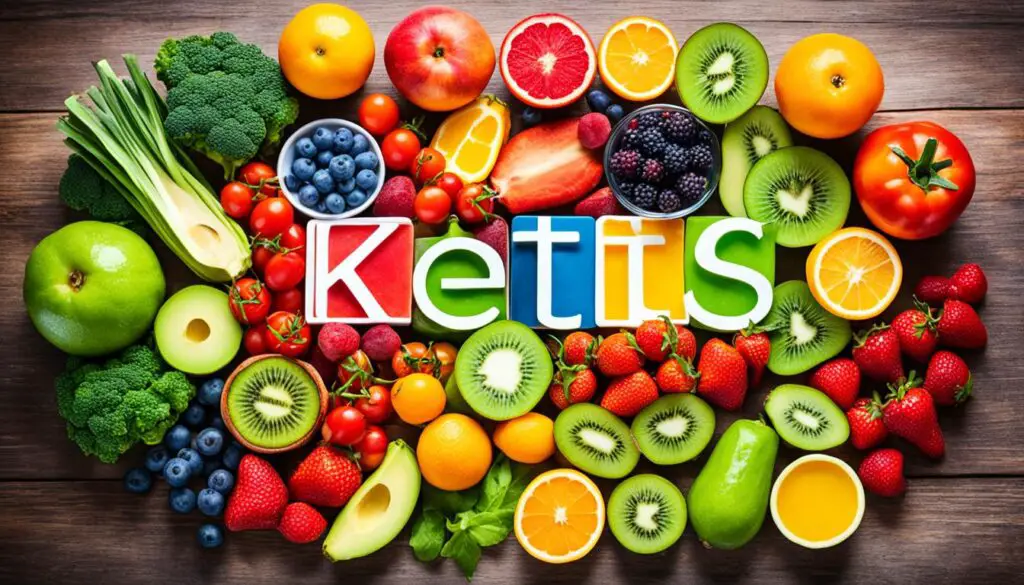
The HCG diet is known to induce a state of ketosis in the body. Ketosis is a metabolic process in which the body utilizes stored fat as the primary source of energy instead of carbohydrates. This state is often associated with low-carb diets and is believed to enhance weight loss.
While following the HCG diet and experiencing ketosis, it is important to maintain proper vitamin intake for overall health and well-being. The good news is that certain vitamins are still allowed during ketosis on the HCG diet.
Among the vitamins that can be safely consumed during ketosis on the HCG diet are magnesium, calcium, and vitamin D. These vitamins not only support overall health but also do not interfere with the state of ketosis. By incorporating these vitamins into your diet, you can ensure that your body receives the essential nutrients it needs while maximizing the benefits of ketosis for weight loss.
To further support your vitamin intake during ketosis on the HCG diet, it is recommended to consume a variety of nutrient-rich foods. Leafy greens, nuts, seeds, and lean proteins are excellent sources of essential vitamins and minerals.
Incorporating vitamin-rich foods into your diet during the HCG diet and ketosis can provide a balanced and nourishing approach to weight loss.
Additionally, it is important to consult with a healthcare professional or nutritionist to determine the appropriate vitamin supplements for your specific needs during the HCG diet and ketosis. They can provide personalized guidance based on your individual health status and weight loss goals.
By paying attention to your vitamin intake and maximizing the benefits of ketosis, you can achieve your weight loss goals while maintaining optimal health during the HCG diet.
Safety and Effectiveness of the HCG Diet
The HCG diet has been a subject of controversy, and there are concerns regarding its safety and effectiveness. The Food and Drug Administration (FDA) has issued a warning against using over-the-counter HCG weight-loss products. The FDA states that HCG has not been scientifically proven to be effective for weight loss and cautions that these products may pose potential risks to individuals.
One of the risks of the HCG diet is severe calorie restriction. With daily calorie intake limited to 500 calories, the body may not receive sufficient nutrients to function optimally. This can result in vitamin and mineral deficiencies, which may have negative effects on overall health.
“Severe calorie restriction and potential vitamin and mineral deficiencies are associated risks of the HCG diet.”
Side effects are also a concern with the HCG diet. These can include fatigue, irritability, restlessness, and depression. Additionally, fluid buildup and swelling of the breasts in males have been reported as potential side effects of the HCG diet. There is also a potential risk of blood clots forming and blocking blood vessels, which can be a serious health issue.
Given these risks and the lack of scientific evidence supporting the effectiveness of the HCG diet, it is important to approach this weight-loss method with caution. Consulting with a healthcare provider before starting any diet is crucial to assess individual health conditions and determine the appropriate course of action.
In summary, the safety and effectiveness of the HCG diet are questionable. The FDA has issued a warning against using HCG weight-loss products, citing the lack of scientific evidence and potential risks. Severe calorie restriction, vitamin and mineral deficiencies, and various side effects are associated with the HCG diet. Prioritizing safe and sustainable weight-loss methods, under the guidance of healthcare professionals, is essential for long-term health and well-being.
The Importance of Safe and Sustainable Weight Loss Methods

When it comes to weight loss, many people are searching for quick and easy solutions. While the HCG diet may offer short-term weight loss results, it is important to prioritize safe and sustainable methods for achieving and maintaining a healthy weight.
Safe weight loss methods involve adopting a balanced and healthy diet that provides all the necessary nutrients for your body’s needs. This includes consuming a variety of fruits, vegetables, whole grains, lean proteins, and healthy fats. Avoiding crash diets and extreme calorie restriction is crucial, as they can pose risks to your overall health and lead to weight regain once the diet is discontinued.
In addition to a healthy diet, regular exercise is essential for sustainable weight loss. Engaging in physical activity not only helps you burn calories, but it also improves cardiovascular health, boosts metabolism, and contributes to overall well-being. Incorporate a combination of cardio exercises, strength training, and flexibility exercises into your fitness routine for optimal results.
While making lifestyle changes for weight loss, it is always advisable to consult a healthcare provider for personalized advice. They can assess your current health status, provide guidance on appropriate calorie intake, help you set realistic goals, and monitor your progress. A healthcare provider can also address any underlying medical conditions that may be affecting your weight and provide tailored recommendations.
Remember, the key to successful and sustainable weight loss lies in adopting healthy eating habits, engaging in regular physical activity, and seeking professional guidance. By prioritizing safe weight loss methods and making lasting lifestyle changes, you can achieve your weight loss goals and improve your overall health and well-being.
HCG Diet Results and Final Thoughts
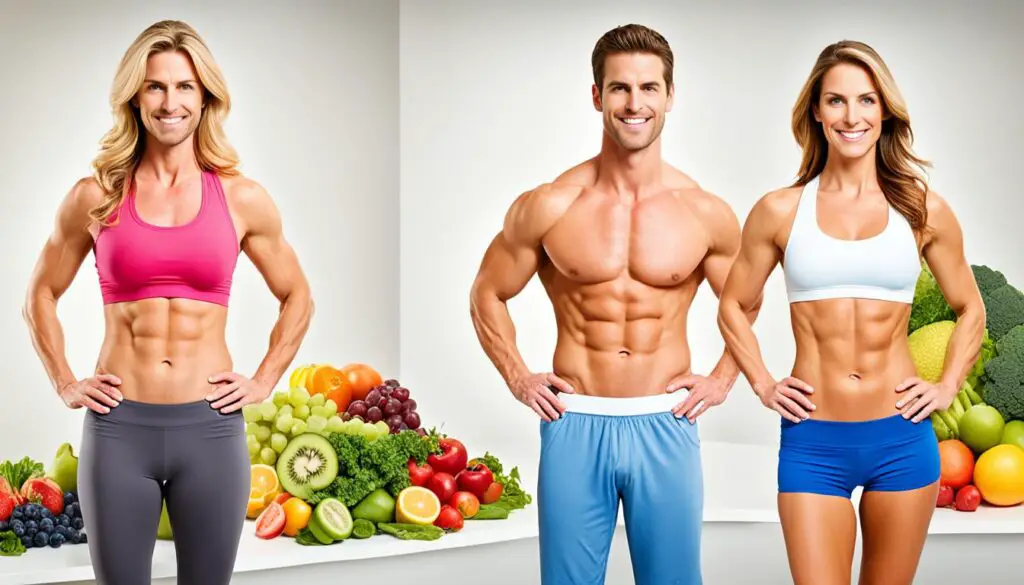
The HCG diet has garnered considerable attention for its potential weight loss results. Many individuals report significant success stories on the HCG diet, with an average weight loss of 1 to 3 pounds per day. These results can be encouraging and motivating for those seeking to shed excess weight.
However, it’s important to recognize that maintaining weight loss after completing the HCG diet requires long-term lifestyle changes. The HCG diet is just the beginning of a weight loss journey, and sustainable habits are crucial for lasting success.
To maintain weight loss, it is essential to adopt a healthy and balanced diet. Focus on incorporating nutrient-dense foods, such as fruits, vegetables, lean proteins, and whole grains. Choose foods that provide essential vitamins and minerals to support overall health and well-being.
Regular physical activity is also key to maintaining weight loss. Engage in regular exercise, such as cardio workouts, strength training, and flexibility exercises. Find activities that you enjoy and make them a part of your daily routine.
Hydration is often overlooked but plays a vital role in weight management. Drink plenty of water throughout the day to stay hydrated, support digestion, and help control appetite.
Final thoughts on the HCG diet: While the HCG diet may provide initial weight loss results, it should be approached with realistic expectations. It is not a quick fix or a long-term solution on its own. Long-term success requires a commitment to a healthy lifestyle that involves proper nutrition, regular exercise, and self-care.
Remember, consult with a healthcare provider before starting any weight loss regimen to ensure it aligns with your individual needs and health goals. By taking a holistic approach to weight loss, you can achieve sustainable results and thrive in your journey towards a healthier you.
Conclusion
In conclusion, while on the HCG diet, additional vitamin supplementation is generally not necessary as the body obtains all the necessary nutrients from the HCG injections, low-calorie diet plan, and stored fat. However, there are a few exceptions that are allowed on the diet, such as vitamin D, vitamin C, and vitamin B12. It is important to check the ingredients of vitamin supplements to ensure compatibility with the diet and avoid any potential interference.
After completing the HCG diet, it is crucial to shift focus towards maintaining a balanced and nutritious diet to support long-term weight management. Incorporating other healthy habits, such as regular physical activity and proper hydration, is also essential. It is always recommended to consult with a healthcare provider before embarking on any weight loss regimen to ensure personalized advice and guidance.
By being mindful of nutrient requirements and adopting sustainable lifestyle changes, individuals can achieve successful weight loss and maintain it in the long run. Remember, the key to effective weight management goes beyond just the HCG diet. It involves embracing healthy habits and making conscious choices to support overall well-being.
FAQ
Do I need extra vitamins on the HCG diet?
According to Dr. Simeons, the doctor who developed the HCG diet, additional vitamin supplementation is generally not necessary. The body obtains all the necessary nutrients from the HCG injections, the low-calorie diet plan, and the stored fat that is burned for energy.
What vitamins are allowed on the HCG diet?
While most vitamins are not recommended on the HCG diet, a few exceptions are allowed. Vitamin D, vitamin C, and vitamin B12 are allowed on the diet, with vitamin D being recommended for patients with tooth problems, vitamin C used to boost the immune system, and vitamin B12 taken through injections or capsules.
What are some post HCG diet nutritional tips?
After completing the HCG diet, it is important to focus on maintaining a balanced and nutritious diet. Some tips include consuming a variety of fruits and vegetables, incorporating lean protein sources, staying hydrated, and incorporating whole grains into your diet.
Can I take vitamins during ketosis on the HCG diet?
While in ketosis on the HCG diet, certain vitamins are still allowed, such as magnesium, calcium, and vitamin D. These vitamins do not interfere with the state of ketosis and can be safely consumed.
Is the HCG diet safe and effective?
The HCG diet has been a subject of controversy, and the FDA has advised against using over-the-counter HCG weight-loss products. Severe calorie restriction and potential vitamin and mineral deficiencies are associated risks of the HCG diet. Side effects of the HCG diet may include fatigue, irritability, restlessness, depression, fluid buildup, and swelling of the breasts in males. Always consult with a healthcare provider before starting any weight loss regimen.
What are some important weight loss methods to consider?
Prioritize safe and sustainable weight loss methods, including adopting a balanced and healthy diet, engaging in regular exercise, and consulting a healthcare provider for personalized weight loss advice. Crash diets and extreme calorie restriction can pose risks to overall health and can lead to weight regain once the diet is discontinued.
What are the results of the HCG diet?
The HCG diet has gained popularity due to its reported weight loss results. On average, individuals can expect to lose 1 to 3 pounds per day while following the HCG diet. However, maintaining weight loss after completing the diet requires long-term lifestyle changes, including a healthy and balanced diet, regular physical activity, and proper hydration.

